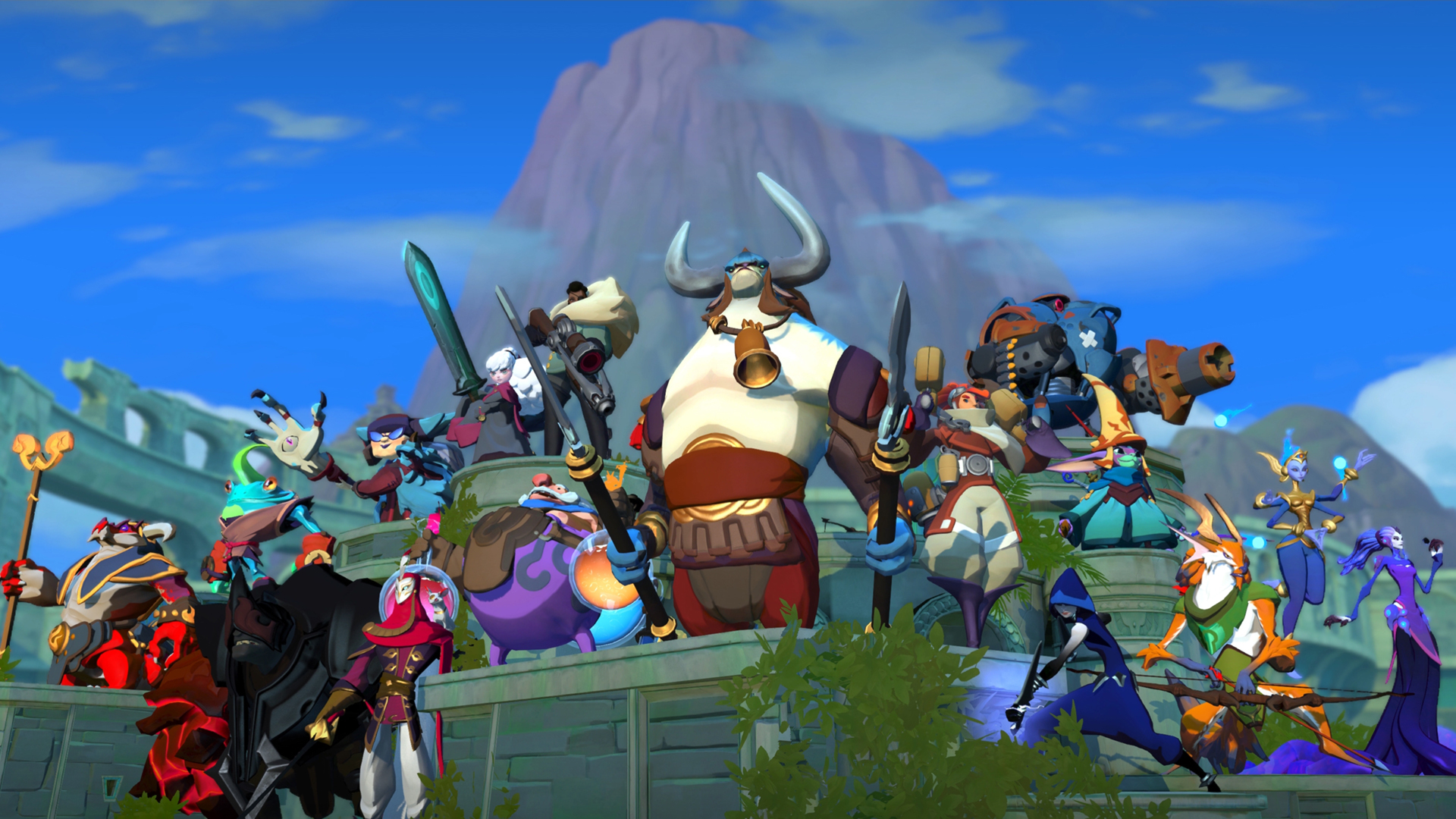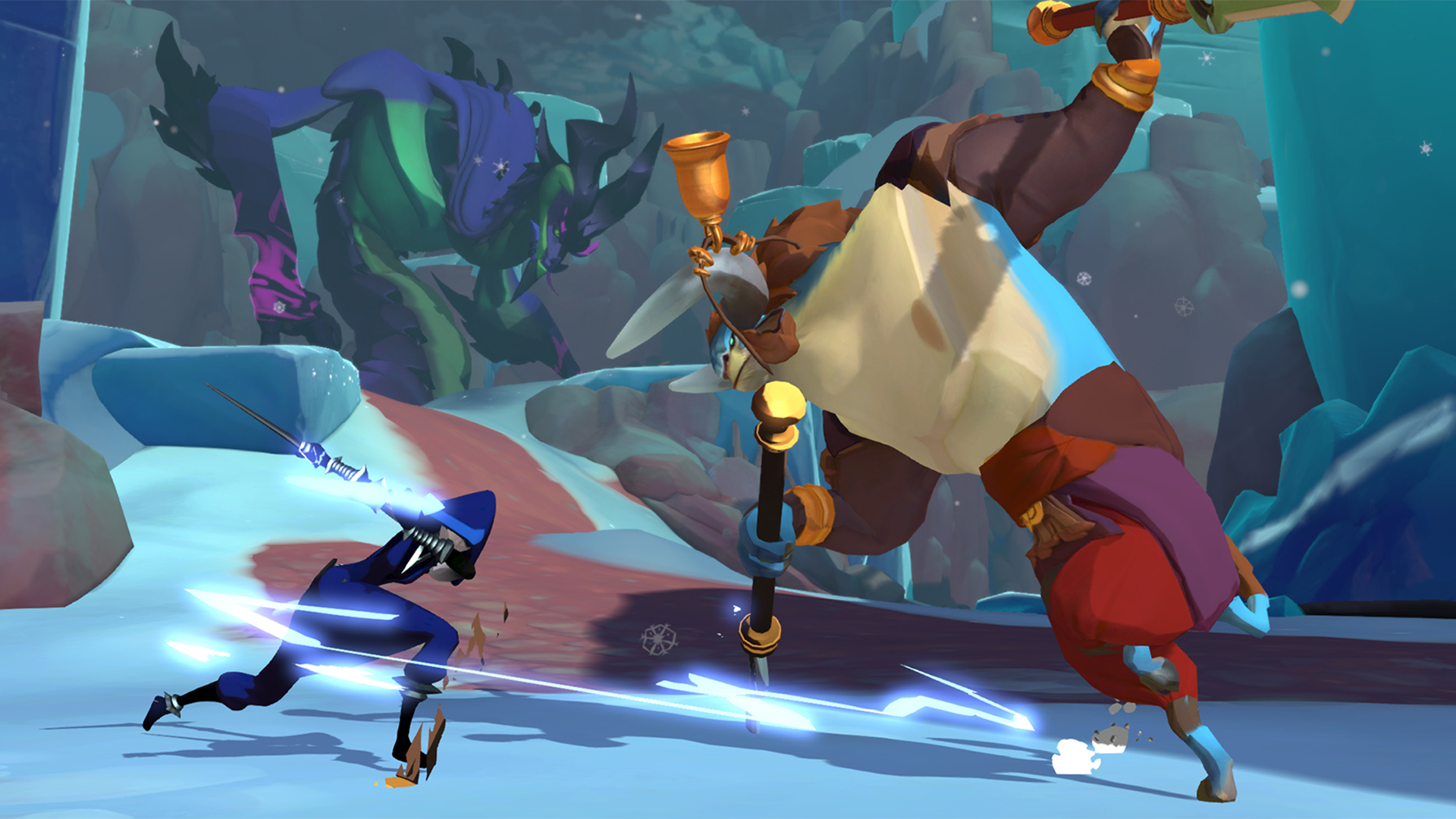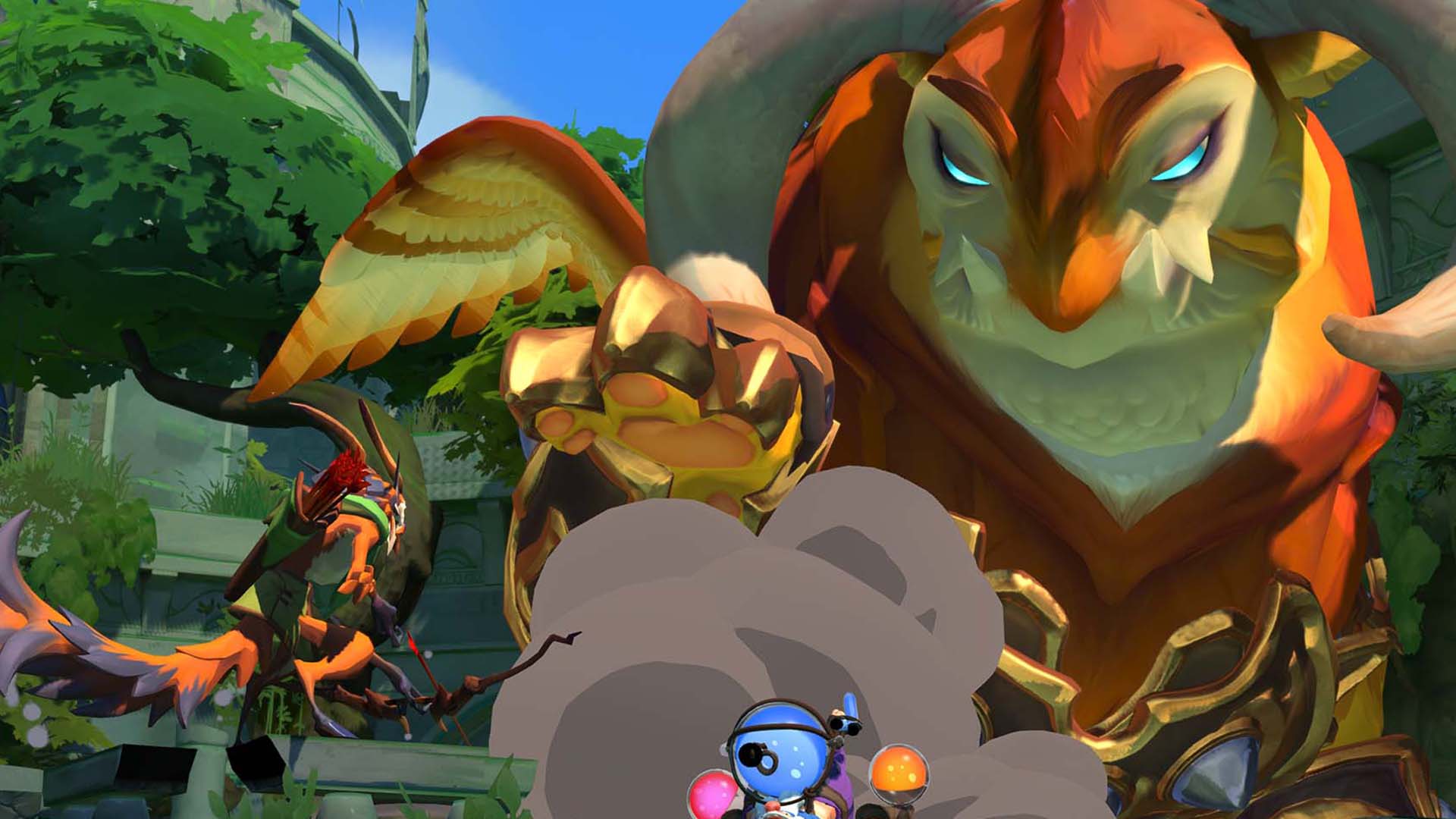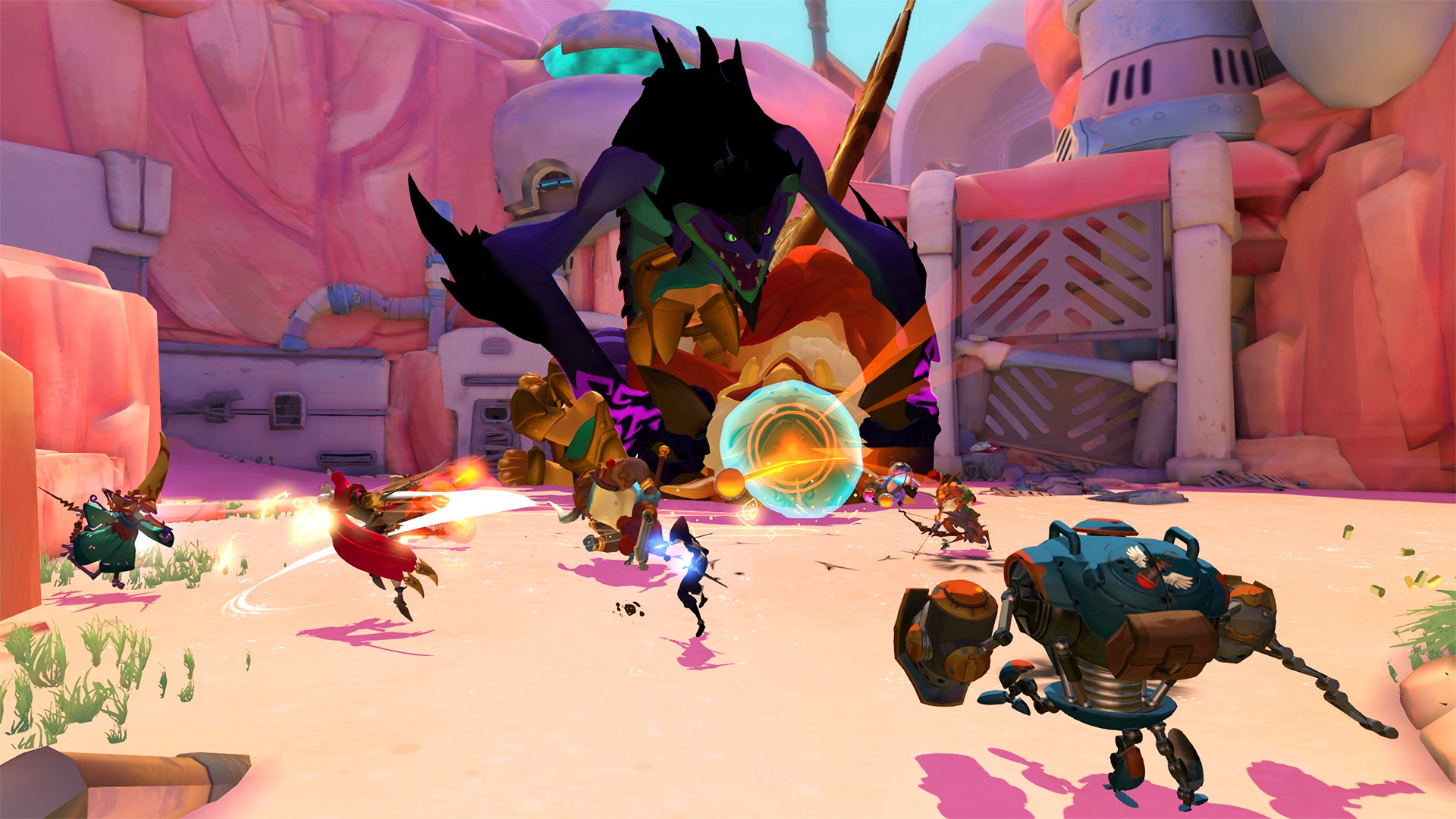The sacrifice Gigantic’s team made to save it from development hell
Delays, layoffs, and lack of funding. Gigantic has survived them all.

Chris Chung tells me he's an optimist. I'm inclined to believe him because I'm not sure how many people could keep faith after everything his studio has been through. In February of 2016, Chung had to do something that no boss ever wants to do. He gathered Motiga's 75 employees in their Bellevue, WA office and told them that there was no money left to pay them. They were all being laid off. For three years, these artists and programmers had worked to build Gigantic, a class-based shooter with the spirit of a MOBA. But in that moment, it looked like Gigantic was dead.
And it might have been, if Chung wasn't an optimist.
When I first spoke with him over Skype, it was two days before Gigantic launched. He seems almost surprised that the moment he and his team worked toward for four years is just 48 hours away. "It took a tremendous amount of effort in order to get us here," Chung tells me.
Carter McBee, Gigantic's lead designer, speaks up: "To finally get to this point, with a free-to-play game like Gigantic, the end of the development cycle is also the beginning of a new cycle. It's been such a long road to get here, and we're only just at the starting line."
But last year, that starting line looked like a million miles away.
In the shadow of giants
When Gigantic was first announced in 2014, it was ahead of its time. Overwatch wouldn't be announced for another few months, and the litany of claimants to the class-based multiplayer throne, like Paladins, were years away. Motiga, an indie studio headed up by Chung, who had held various executive positions at Trion Worlds and NCSoft, was poised to cash in on what would become one of the most competitive genres of recent years.
And yet, Chung tells me that Gigantic, despite the similarities, was never meant to compete with games like Overwatch. It's inspirations come from a different genre entirely. "We wanted to take the PvP and PvE elements of an MMO and combine them into a singular experience and build a competitive game around that," Chung says.
The biggest gaming news, reviews and hardware deals
Keep up to date with the most important stories and the best deals, as picked by the PC Gamer team.
We wanted to take the PvP and PvE elements of an MMO and combine them into a singular experience and build a competitive game around that.
Chris Chung
The idea was simple: Two teams of five would rush through a mini-dungeon before colliding in a chaotic three-way fight with a neutral boss monster. "What we discovered was the PvP aspect of it was a lot more fun than fighting this huge boss monster," Chung explains. "So we pivoted and said, hey, what if we take the boss monster and not only make it a part of your team but a part of each team?"
That switch is responsible for what Gigantic is today. Instead of pushing through static rows of towers to destroy a defenseless base like in most MOBAs, Gigantic's objectives are far more exciting.

On each end of its three maps, two colossal beasts wait for their respective teams make them offerings of energy. As you move across the map, engaging the enemy team and working to capture control points, minor victories fill your guardian's energy meter. In the same way that guardians bring MOBA's bases to life, players can summon different kinds of creatures on the map's various control points. These creatures automatically siphon energy back to the guardian, but they also change the strategic landscape you fight on. One creature, for example, might build barriers that force attacking opponents into choke points. Another heals you, letting you get back in the action more quickly. All of them are capable of giving an enemy player a beating.
When a guardian siphons enough energy, they go on a rampage and that's when things get interesting. A massive, coiled wyvern, for example, springs from its nest and lunges across the map, tackling and pinning the enemy guardian so that your team can damage it while the other team tries to repel the assault. The first time a guardian thunders across the map is thrilling.
"When we pivoted into embracing the PvP and competitive gameplay the goal wasn't to make a different style of MOBA, a different style of shooter, or to even make a different subsection of an MMO-style PvP game," McBee explains. "Really, it was to make a great competitive game."
But regardless of McBee's and Chung's vision, Gigantic is now entering a brutally competitive genre. Overwatch, Battleborn, Paragon, Paladins, Smite—the list goes on. I ask Chung how he's feeling about the launch. "Excited but also nervous," he says, pointing to how dramatically the genre has expanded since Gigantic was first announced. Gigantic was supposed to launch two years ago. But as Chung knows all too well, even the best laid plans often go awry.
Don't turn out the lights
The day Chung told his 75 employees Motiga was out of cash, no one was surprised. They had watched, week after week, as the final bit of funding ran dry. By now, Gigantic's troubled development was very public.
In 2014, Motiga signed a partnership deal with Microsoft to bring Gigantic exclusively to Xbox One and Windows 10. It was a controversial move at the time and many players weren't happy about it because Windows 10 was far from ubiquitous. It also created problems internally. "We really underestimated the effort required to make games work on a totally new platform," Chung confesses.
McBee tells me that, originally, Gigantic had been built with a web-based front-end somewhat similar to what EA's Battlefield 3 and 4 used. Here, players could connect and chat before booting up the actual game to jump into a match. The problem was that, after Motiga signed their deal with Microsoft, all of it was useless—Xbox One didn't allow for a front-end separate from the actual game. "We had to scrap that whole thing and rebuild everything in-game," McBee explains. "We had months and months of development work that we had to, essentially, start over with. It was a very big challenge for us."
Gigantic had attracted a small but excited community by then, but with core services like chat and matchmaking out of commission, the open beta was struggling. What's worse, those internal delays snowballed, and by the end of 2015, Gigantic suffered its first round of layoffs, letting go of non-essential development staff to stretch their finite amount of funding into 2016. Around that time Chung tells me it became clear Gigantic was in trouble: "We knew we would be running out of funding in February."

He began desperately searching for a publishing partner who would be willing to invest in Gigantic, hoping that, like his team, someone would appreciate how special the game was. Despite several interested parties, Chung says these deals can take a lot of time—time that Motiga didn't have. In the beginning of February, the company coffers ran dry. "The timing just didn't work out right," Chung says. "We ran out of funding so we had to lay off everyone in the company, and I mean it. Everyone."
It was over. Or it was supposed to be.
"The next day everyone showed up to the studio," Chung says, still sounding a little baffled. "They just kept working."
It was a sacrifice the employees I spoke to didn't make lightly.
"Everyone got laid off, but we all really cared about the project," Vinod Rams, Gigantic's senior concept artist tells me over the phone. "It wasn't like other companies where you were like, okay, well I'm going somewhere else. We knew Gigantic had to come out, so we all stuck around. It was really cool."
Even though we were all laid off and we were out of money, no one was willing to accept that this would be the fate of the game.
Carter McBee
"Even though we were all laid off and we were out of money, no one was willing to accept that this would be the fate of the game," McBee says. "We all believed so much in the game, we just thought, there's no way that it's going to end like this. That's what drove us to come back, because we believed we'd been working on something special."
For Chung, the moment he saw almost all of his 75 employees return to work was defining. If they still believed, so would he. "There were a few moments in this endeavor where I shed tears, and that was one of those days. It was one of the most heartfelt things, to see everyone come back the next day."
The next weeks were some of the most challenging the indie studio has ever faced. Both McBee and Rams tell me how scary it was showing up each day, not knowing if or when they might get paid. "The biggest thing was the unknown," McBee says. "It's one thing to say, okay, you're going to miss a paycheck, but there wasn't even that sense of security. We had no idea what was going to happen."
"Let me tell you, I wasn't sleeping a whole lot during that time," Chung says uneasily. "I was making phone calls, writing emails, and making pitches all day. For me, I'm an optimist to begin with, and I was very optimistic that we not only had a great game but a special team that wanted to work together and see this through. I was optimistic that someone out there would help us achieve our dream."
For Rams, that was more than enough to keep him coming to work. "We'd get daily updates from Chris, and he'd tell us about who he was talking to and what's going on. I remember telling my wife that I really trust Chris. I knew he was going to fight tooth and nail to keep this going."
I remember telling my wife that I really trust Chris. I knew he was going to fight tooth and nail to keep this going.
Vinod Rams
For nearly three and a half weeks, most of Motiga's employees continued to work and hope. While some were inevitably forced to move on to meet their financial needs, "around 90 percent" stayed and trusted that someone would eventually step in and save Gigantic.
And then, after weeks of discussions, Yunfan Zhang and Bill Wang of Perfect World Entertainment, best known for MMOs like Neverwinter and Star Trek Online, came to Motiga's offices to meet with Chung. "They were amazed that people were still working at 6:30 at night, weeks after they were laid off," Chung says. "I remember we were working on a patch. After the meeting, Yunfan Zhang grabbed my hand and said, Chris, we're going to make this work."

But many of Motiga's employees couldn't wait any longer, so Perfect World did something bold: "Before we even signed the deal, they sent us the money so we could fulfill our payroll obligation," Chung says. "It had a huge impact [on morale], especially with the loan for the payroll obligation. It gave us a huge boost. We finally had a partner that could help us get to the homestretch."
Motiga was saved, and in May, their publishing deal with Perfect World was made public. Gigantic would no longer be exclusive to just the Windows 10, but would also release on Steam and Perfect World's own storefront.
Just the beginning
Being a free-to-play game means they've only just reached the starting line—everything up until now is just prologue.
Despite the hellish journey getting Gigantic to launch, the bigger battle has just begun. As McBee says, being a free-to-play game means they've only just reached the starting line—everything up until now is just prologue. Chung says the team is confident Gigantic will carve out a space for itself. "There is depth and nuance to Gigantic that isn't really found in the other games that are out there," he argues.
What's more, Motiga is well prepared for the future. The silver lining of the delay means that Gigantic has been able to frontload their post-launch roadmap and the team has committed to releasing new content on a monthly basis. "What we have released so far is probably less than half of what we have in the pipeline right now," he says.
Since it launched yesterday, Gigantic's success has been humble. Right now, 6000 players are logged in on Steam—only a portion of the numbers Paladins, let alone Overwatch, is attracting. But word seems to be spreading.
Still, for a team that once wondered at what point their office would have its electricity turned off—not to mention when they'd be able to pay their own bills, Gigantic's launch is a resounding success. "We've been through some tremendous ups and downs throughout the history of Motiga," Chung says. "So for all of us, there's a lot of excitement and anticipation that our baby is now going to be out in the big world."
Gigantic's biggest battle will be in the months to come, and it's not clear if the sacrifices of its developers will ever pay off. But Chung is hopeful. He's an optimist.
With over 7 years of experience with in-depth feature reporting, Steven's mission is to chronicle the fascinating ways that games intersect our lives. Whether it's colossal in-game wars in an MMO, or long-haul truckers who turn to games to protect them from the loneliness of the open road, Steven tries to unearth PC gaming's greatest untold stories. His love of PC gaming started extremely early. Without money to spend, he spent an entire day watching the progress bar on a 25mb download of the Heroes of Might and Magic 2 demo that he then played for at least a hundred hours. It was a good demo.


